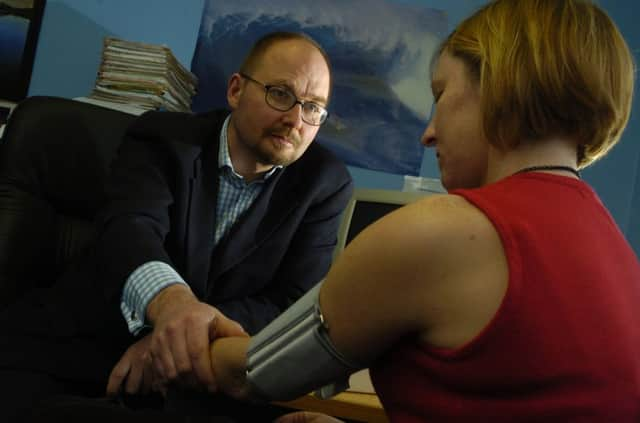Scottish GPs to spend more time with patients


The British Medical Association (BMA) Scotland said the contract agreements made with the Scottish Government would give family doctors more stability to plan their services and focus on the challenges they face.
It comes after BMA Scotland chair Brian Keighley warned at their annual conference that the continuing pressures facing the NHS in Scotland in the last five years had been like a “car crash”, including factors such as the increasing amount of work being placed on GPs.
Advertisement
Hide AdAdvertisement
Hide AdWhile contract arrangements for GPs are normally negotiated annually, the latest measures agreed with the BMA’s Scottish GPs Committee will remain in place until April 2017 meaning practices will not have to spend time adapting to frequent changes.
The Scottish Government said this would given doctors financial and contractual stability to help tackle the problems they say they are facing, such as carrying out more work in primary care that was traditionally done in hospitals.
GP practices in many areas have also struggled to recruit and retain staff in recent years, leading to fears that more surgeries will be forced to close.
The contract agrees to no major changes to the Quality and Outcomes Framework (QOF), which awards practices funding if they carry out certain tasks, such as blood pressure checks.
The amount of funding awarded in this way has been reduced by a third this year and will remain unchanged for next three years, with more income coming through core funding rather than performance-related pay.
The Scottish Government said this would also reduce the bureaucracy GPs faced in completing the QOF paperwork and give them more time to spend with patients.
Current automatic “Golden Hello” payments made to some GPs when they start work in a particular area will also be removed, except in remote, rural and deprived locations.
Instead, the funding will be targeted at areas with significant problems recruiting doctors, as well as paying to develop a new programme to support GPs wanting to return to work.
Advertisement
Hide AdAdvertisement
Hide AdThe Scottish Government also agreed that it would review payments given to GPs based on their experience to help retain doctors, but with no changes to the programme before 2017/18.
In addition, GPs will be given a role in key changes to NHS services in the coming years, including the merging of health and social care.
The BMA welcomed the three-year deal, which it said would give stability and financial security but would more importantly free doctors up to focus on the issues that have been worrying them, such as workload.
Dr Alan McDevitt, chair of the BMA’s Scottish GPs committee, said: “This agreement is the culmination of ongoing negotiations that we began last year.
“In November 2013, we began the process of reducing bureaucracy and creating financial stability for general practice to enable GPs to spend less time ticking boxes and more time focusing on the patient in the consultation.
“Scottish general practice is on the brink of crisis. Having time to focus on finding solutions to the pressures of rising workload and the problems of recruitment and retention will enable us to protect and support the model of general practice that is so valued by our patients.”
Health Secretary Alex Neil, said: “This contract emphasises the importance of the professionalism of GPs, and demonstrates our commitment to a significant period of stability of the contract and for funding.
“There are great benefits to be gained from working jointly with the profession to further develop and support GP services for patients in line with our 2020 vision for health and social care.
Advertisement
Hide AdAdvertisement
Hide Ad“This will be particularly important as we begin to carry out a wide-ranging review of the GMS (General Medical Services) contract over the next few years with a view to ensuring Scotland’s GP services are well-prepared for the future.”